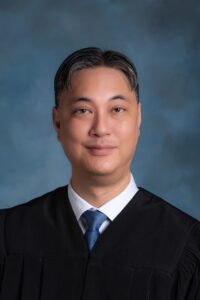Celebrating the Career and Wisdom of Hon. Steve B. Chu (UC Law SF Class of ’02), U.S. Magistrate Judge
 The Hon. Steve B. Chu, U.S. Magistrate Judge for the Southern District of California, exemplifies the values of public service, dedication, and a lifelong commitment to learning. As a proud graduate of the University of California College of Law, San Francisco (formerly UC Hastings) and the first Asian-American Magistrate Judge in the Southern District, Judge Chu reflects on his journey from aspiring lawyer to esteemed jurist, offering invaluable insights for today’s law students.
The Hon. Steve B. Chu, U.S. Magistrate Judge for the Southern District of California, exemplifies the values of public service, dedication, and a lifelong commitment to learning. As a proud graduate of the University of California College of Law, San Francisco (formerly UC Hastings) and the first Asian-American Magistrate Judge in the Southern District, Judge Chu reflects on his journey from aspiring lawyer to esteemed jurist, offering invaluable insights for today’s law students.
A Calling to Serve
Judge Chu’s path to law began with a strong sense of purpose. Growing up in a family with roots in Taiwan, he was deeply inspired by the principles of the rule of law and the potential for legal systems to advance societal progress.
“My father grew up with limited means. He was the first from his family to go to college, and he made a better life for our family through his hard work.”
While working in Washington, D.C., he was struck by the open-mindedness and determination of his colleagues from California. Their example motivated him to contribute to the country’s progress through public service and, ultimately, to move out west for law school.
“I’ve always been drawn to the idea of law as a framework for fairness and growth,” he shared. This sense of calling ultimately guided him to roles as an Assistant U.S. Attorney and eventually a U.S. Magistrate Judge.
Building a Foundation at UC Law SF
During his time at the UC Law SF, Judge Chu made the most of his education. He took a negotiations class as a 3L with adjunct professor Arlene Costant, an experience he now wishes he had encountered earlier in his studies. “We negotiate every day of our lives,” he noted. “It’s such an essential skill, and learning it in law school can set you up for success.”
Judge Chu was also a founding member of the Negotiation and Dispute Resolution Competition Team, coached by former Center for Negotiation and Dispute Resolution (CNDR) Director Professor Chris Knowlton. His involvement didn’t end with graduation—Judge Chu and his wife, a fellow UC Law SF alumna, often returned to coach or judge competitions. These experiences reinforced his belief in the importance of practical, skills-based learning.
Early in his career, Judge Chu was recommended by Professor Knowlton for a mediation training scholarship, an opportunity that shaped his approach to negotiation and settlement. “Active listening and open communication are critical,” he emphasized. “While there’s a natural tendency in litigation to withhold information, sometimes laying your cards on the table fosters trust and leads to better outcomes.”
Career Highlights and Lessons Learned
In his legal practice, Judge Chu prioritized collaboration and mutual respect. He often invited opposing counsel for coffee to discuss cases informally, finding common ground and fostering goodwill. “You’re going to argue your position,” he said, “but understanding each other’s interests can lead to practical, effective settlements.”
Judge Chu’s career trajectory was shaped by his dedication to gaining meaningful experience over pursuing prestige or financial gain. Early on, he sought roles that allowed him to develop practical skills—arguing motions, taking depositions, and second-chairing trials. “Experience is currency,” he observed. “The more you invest in learning your craft, the more opportunities open up for you.”
This approach also reflected his broader philosophy. At the National DOJ Training Center, he was taught: “Do the right thing, in the right way, for the right reasons.” If one can follow those guidelines, then regardless of the outcome of the case, one has done a good job. Whether working in the White House on President Clinton’s initiative on race relations or resolving high-stakes disputes as a Magistrate Judge, Judge Chu’s focus has always been on integrity and excellence.
Advice for Aspiring Lawyers
For current law students, Judge Chu’s advice is both practical and inspiring:
- Embrace Uncertainty: “It’s okay not to know exactly what you want to do,” he said. What matters is staying curious and committed to growth.
- Follow Your Passion: “Life is too short to sleepwalk through it. Pursue what you love, not what others think you should do.”
- Learn to Negotiate: Negotiation isn’t just for the courtroom. It’s a life skill that helps in every professional and personal interaction.
- Build Relationships: Judge Chu’s career underscores the importance of fostering positive relationships with mentors, peers, and even opposing counsel. “The relationships you build are often more meaningful than the results of any particular case. Your reputation gets around.”
- Resolve conflicts with Integrity: It’s not necessary to yell or be aggressive to stand up for yourself. “Focus on the issues and the facts, and advocate effectively without losing your professionalism.”
Looking Ahead
Judge Chu’s reflections offer a powerful reminder of the values that underpin the legal profession: service, integrity, and continuous learning. His story is a testament to the transformative power of a legal education, particularly one enriched by negotiation and dispute resolution training. For students at UC Law SF, his journey highlights the potential to make a meaningful impact, not just as a lawyer but as a leader in society.
CNDR is proud to count Judge Chu among UC Law SF’s distinguished alumni. “We hope his story inspires more students to learn about negotiation and dispute resolution,” said Professor Hiro Aragaki, the Faculty Director of CNDR.